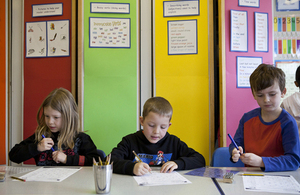Disadvantaged children to benefit from ‘life-changing’ money
Over £1 million has been given to the first local authorities to implement the early years pupil premium (EYPP).

New government funding to help the most disadvantaged children receive high-quality early education has been implemented in 7 local authorities from this week.
Over £1 million will be distributed between local authorities in Blackpool, Bristol, Cambridgeshire, North Yorkshire, Northamptonshire, Hackney and Stoke-on-Trent to implement the early years pupil premium (EYPP) in their areas.
The money will be distributed to early years providers delivering the funded entitlement for 3- and 4-year-olds, who will receive up to £300 extra per year for each disadvantaged child who meets the eligibility criteria.
The Department for Education will ask for feedback from the councils before the full £50 million EYPP is implemented throughout England in April 2015.
Deputy Prime Minister Nick Clegg said:
One of my top priorities in government is to build a fairer society where children from every background get the start in life that they deserve.
This new funding from the early years pupil premium will allow schools and nurseries to give extra help to toddlers from the poorest families so they can develop and learn quickly and prevent them falling behind other children when they start school.
Childcare Minister Sam Gyimah said:
I’m delighted we are helping the most disadvantaged children get the best possible start in life.
Good-quality early education should not be denied to anyone. Children who get it go on to do better at school and earn higher wages, so the early years pupil premium will be a life-changing injection of money.
I would encourage any parent who meets the EYPP criteria to tell a local provider they are eligible. The provider will then alert the local authority to access the funding.
Children will qualify if they are 3- or 4-years-old, are receiving government-funded early education and their parents receive benefits used to access eligibility for free school meals.
A survey published in 2014 found that disadvantaged 3- and 4-year-olds are up to 7 percentage points less likely to participate in early education.
In 2013, just 36% of pupils eligible for free school meals achieved a good level of development in the early years (under 5s) foundation stage compared with 55% of other pupils.
The Department for Education will ask for feedback from the council before the full £50 million EYPP is implemented throughout England in April 2015.
Last year’s Effective Pre-school Primary and Secondary Education (EPPSE) report ‘Influences on students’ development at age 16’ showed that quality of provision can have a major impact on a child’s school readiness. The benefits of pre-school have been found to be higher for pupils from disadvantaged backgrounds.
Notes to editors
The 7 local authority areas, and their early implementation grants are:
- Blackpool (£76,745)
- Bristol (£197,591)
- Cambridgeshire (£132,979)
- North Yorkshire (£100,567)
- Northamptonshire (£201,655)
- Hackney (191,543)
- Stoke-on-Trent (£137,198)
The funding is based on the estimated number of eligible children. The total funding is £1,038,278.
All registered early years providers that take children for the funded early education entitlement - including school nurseries and maintained nursery schools; private, voluntary and independent providers; and childminders - will be eligible to claim the EYPP for eligible 3- and 4-year-olds.
Children will be eligible if they are 3- or 4-years-old and receiving government funded early education in any provider, and their parents are in receipt of one or more of the following benefits which are the benefits used to access eligibility for free school meals:
- Income Support
- Income-based Jobseekers Allowance
- Income-related Employment and Support Allowance
- Support under Part VI of the Immigration and Asylum Act 1999
- the guaranteed element of State Pension Credit
- Universal Credit
- Child Tax Credit (provided you’re not also entitled to Working Tax Credit and have an annual gross income of no more than £16,190)
- Working Tax Credit run-on - paid for 4 weeks after you stop qualifying for Working Tax Credit
Or if they have been:
- looked after by the local authority for at least 1 day
- have been adopted from care
- have left care through special guardianship
- children subject to a child arrangement order setting out with whom the child is to live (formerly known as residence orders)
DfE media enquiries
Central newsdesk - for journalists 020 7783 8300